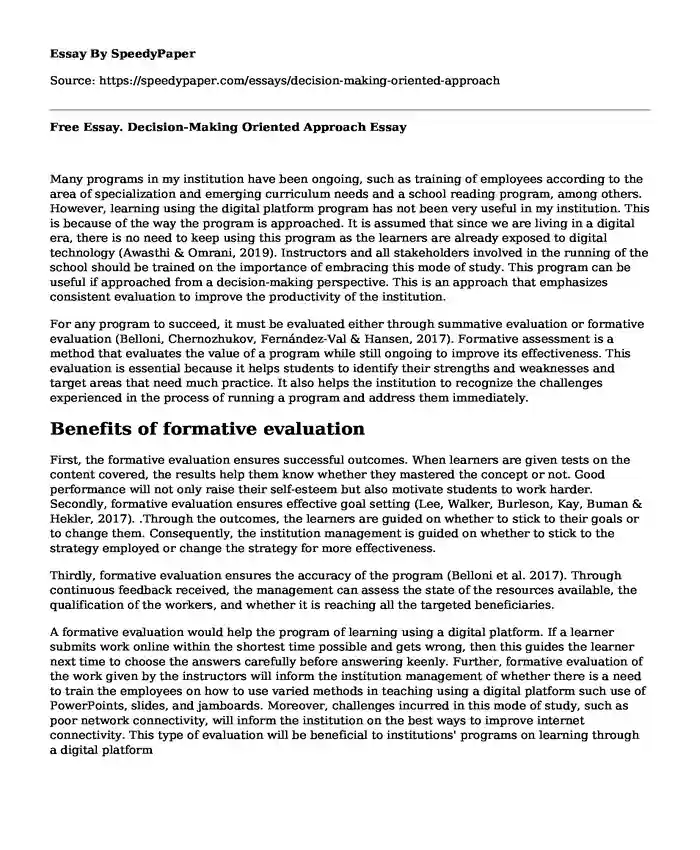
| Essay type: | Cause and effect essays |
| Categories: | Learning Pedagogy Information technologies Essays by wordcount |
| Pages: | 3 |
| Wordcount: | 696 words |
Many programs in my institution have been ongoing, such as training of employees according to the area of specialization and emerging curriculum needs and a school reading program, among others. However, learning using the digital platform program has not been very useful in my institution. This is because of the way the program is approached. It is assumed that since we are living in a digital era, there is no need to keep using this program as the learners are already exposed to digital technology (Awasthi & Omrani, 2019). Instructors and all stakeholders involved in the running of the school should be trained on the importance of embracing this mode of study. This program can be useful if approached from a decision-making perspective. This is an approach that emphasizes consistent evaluation to improve the productivity of the institution.
For any program to succeed, it must be evaluated either through summative evaluation or formative evaluation (Belloni, Chernozhukov, FernándezVal & Hansen, 2017). Formative assessment is a method that evaluates the value of a program while still ongoing to improve its effectiveness. This evaluation is essential because it helps students to identify their strengths and weaknesses and target areas that need much practice. It also helps the institution to recognize the challenges experienced in the process of running a program and address them immediately.
Benefits of formative evaluation
First, the formative evaluation ensures successful outcomes. When learners are given tests on the content covered, the results help them know whether they mastered the concept or not. Good performance will not only raise their self-esteem but also motivate students to work harder. Secondly, formative evaluation ensures effective goal setting (Lee, Walker, Burleson, Kay, Buman & Hekler, 2017). .Through the outcomes, the learners are guided on whether to stick to their goals or to change them. Consequently, the institution management is guided on whether to stick to the strategy employed or change the strategy for more effectiveness.
Thirdly, formative evaluation ensures the accuracy of the program (Belloni et al. 2017). Through continuous feedback received, the management can assess the state of the resources available, the qualification of the workers, and whether it is reaching all the targeted beneficiaries.
A formative evaluation would help the program of learning using a digital platform. If a learner submits work online within the shortest time possible and gets wrong, then this guides the learner next time to choose the answers carefully before answering keenly. Further, formative evaluation of the work given by the instructors will inform the institution management of whether there is a need to train the employees on how to use varied methods in teaching using a digital platform such use of PowerPoints, slides, and jamboards. Moreover, challenges incurred in this mode of study, such as poor network connectivity, will inform the institution on the best ways to improve internet connectivity. This type of evaluation will be beneficial to institutions' programs on learning through a digital platform
Response to Jeremy's post
According to Jeremy, the program of training employees in his organization was not sufficient.This program would, however, benefit from a decision-oriented approach. Training should be given to new members of staff to help them familiarize on the organization's mission vision rules and regulations and working conditions (Lee et al., 2017). This is important as a well-trained employee will be able to work with less supervision and wastage of working hours as they consult. The existing employees will also benefit from the decision-oriented approach as they will communicate to their employers the areas they need to be trained on. This training will boost the morale of the employees and consequently lead to an organization's success.
References
Awasthi, A., & Omrani, H. (2019). A goal-oriented approach based on fuzzy axiomatic design for sustainable mobility project selection. International Journal of Systems Science: Operations & Logistics, 6(1), 86-98. https://doi.org/10.1080/23302674.2018.143583
4Belloni, A., Chernozhukov, V., FernándezVal, I., & Hansen, C. (2017). Program evaluation and causal inference with highdimensional data. Econometrica, 85(1), 233-298. https://doi.org/10.3982/ECTA12723
Lee, J., Walker, E., Burleson, W., Kay, M., Buman, M., & Hekler, E. B. (2017, May). Self-experimentation for behavior change: Design and formative evaluation of two approaches. In Proceedings of the 2017 CHI conference on human factors in computing systems (pp. 6837-6849). https://doi.org/10.1145/3025453.3026038
Cite this page
Free Essay. Decision-Making Oriented Approach. (2023, Oct 26). Retrieved from https://speedypaper.com/essays/decision-making-oriented-approach
Request Removal
If you are the original author of this essay and no longer wish to have it published on the SpeedyPaper website, please click below to request its removal:
- Obesity Essay Example from Our Database
- Free Essay: The Impact of Foreign Exchange Effects on the Internationalization of Enterprises From Emerging Markets
- Diversity, Cultural Competence and Human Rights
- HRM Essay Example: Develop a Supporting Human Resource Plan
- Emotionally Intelligent in Healthcare, Free Essay
- Free Essay: Madison & Hamilton Analysis of the Federalists Papers
- Essay Sample on Open Government Implementation
Popular categories




